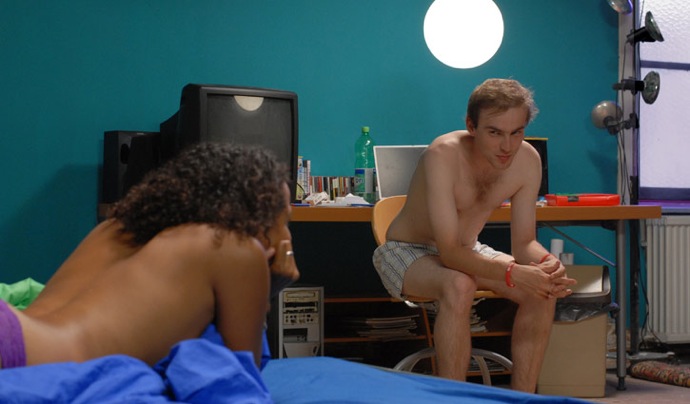Jan 25, 2010 1
Omer Fast is the next Steve McQueen
Move over, Ryan Trecartin: Omer Fast is the current video artist taking over New York. His solo turn at the Whitney, combined with a show of recent work at Postmasters, reveal that he is eminently qualified and more than ready to undertake a feature film. Like the British video artist Steve McQueen, whose Hunger wowed the film world, Fast’s work deserves to be seen by a wider audience. His work is largely in the vein of simulated social documentary that exploits the surface effects of the Hollywood film, pushing the format to a well-tempered extreme to strengthen the irony and distance from that which it critiques. Fast doesn’t shirk from the big issues of today: the aftershocks of war and combat, refugees and displaced persons, racial stereotyping, and the tyranny of the modern police state. But the worlds that he creates are marked by reversals, distinctions, nuances and contradictions, and thus his work does not fall prey to the trap of the “issue” film. Technically accomplished, his films evoke more than they explain, in keeping with Fast’s multi-layerd approach to his subject matter. Formally Fast makes use of split screens, green screens, lush film stocks (most of his work is shot on Super-16) and exaggerated sound effects: this is film-as-artifice, all the way. Yet it is so much more than that: each film manages to probe its connections to mainstream media stereotypes, fictions of the self and nation-state, and constructions of a linear time unburdened by memory.

A still from Nostalgia, 2009. In a hypothetical role-reversed future, an English man is being interviewed for asylum in an unspecified African country.
Fast’s multi-channel pieces, taken together, are approaching feature-film length. I really do think we have the next important auteur on our hands here, and Fast’s quick ascent in the art world closely mirrors that of McQueen. Other potentially useful comparisons: he addresses social concerns similar to the Dardenne brothers. His hybrid approach resembles Isaac Julien’s melding of fiction and documentary. And he is skillful at invoking a self-reflexive critique of media discourse that adds another layer of interpretation to the narrative, like almost all the work of Amos Gitai. Omer Fast is too prodigiously talented to be confined to the white walls of the art world — let’s see his work up on the big screen.

From De Grote Boodschap [The Big Message, 2007]. A Belgium beat-boxer is a unnerving combination of both man and machine.
Holland Cotter’s review of Fast’s two shows, from The New York Times
An interview with Fast and a clip from The Casting, his tour-de force at the 2008 Whitney Biennial